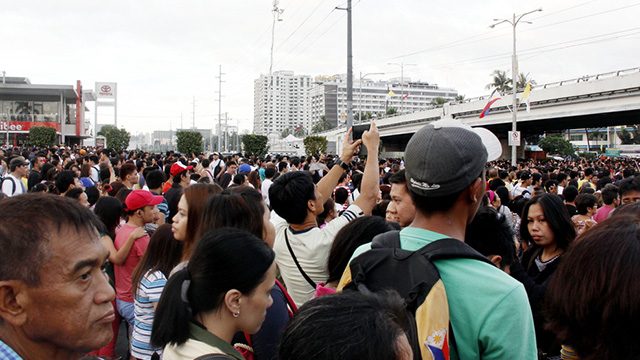SUMMARY
This is AI generated summarization, which may have errors. For context, always refer to the full article.

MANILA, Philippines – The Philippine government is losing at least P250 million a year with regulators’ inaction on the reallocation of the 700 megahertz (MHz) spectrum band, which is mostly held by San Miguel Corporation (SMC).
This was the statement of Globe Telecom, Incorporated director for policy division Ariel Tubayan during the Economic Journalists Association of the Philippines (EJAP) business forum in Makati City on Monday, April 11.
“The government is losing close to at least P250 million in annual spectrum users fees with the embargo of 700 MHz frequency. It is the revenue the country needs for public welfare and public services,” Tubayan said.
It has been about 7 years since the Philippines’ two largest telcos, Globe and the Philippine Long Distance Telephone Company (PLDT), first asked the National Telecommunications Commission (NTC) to “fairly reallocate” the unused 700 MHz.
Until now, the Philippine telco regulator has not responded to Globe’s and PLDT’s requests, leaving the two companies in limbo. (READ: The future of 700 MHz band remains unclear)
“Frequencies are the raw materials for mobile telephony and mobile data. Republic Act 7925 recognizes that the radio frequency spectrum is a scarce public resource that shall be administered in the public interest, and granted to the most qualified service providers who will use it efficiently and effectively,” Tubayan said.
San Miguel holds most of the 700 MHz in addition to its 800,1800, 2300, and 2500 frequency bands.
PLDT, meanwhile, has rights to 800 MHz, 900 MHz, 1,800 MHz, and 2,100 MHz bands. Globe holds 900 MHz, 1,800 MHz, and 2,100 MHz bands.
The amount of spectrum assigned to a telco impacts the cost of the build capacity, overall network performance, ability to offer new multimedia services, and general customer experience of wireless services. (READ: New Internet speed minimum throwback to ’90s?)
“Since customer welfare is paramount objective of competition, antitrust legislation or policy in telecommunications should continue to allow free and fair competition to flourish, not use the law to protect one of the competitors,” Tubayan said.
“Antitrust enforcement must avoid unintended consequences of eventually harming the consumers where efforts to maintain competition will in fact result in higher prices, less innovation, and inferior quality products because competitors are protected from their inefficiencies,” he added.
For PLDT, measures should be undertaken for the NTC to respond to their long overdue requests.
PLDT had said it would bring the matter to the attention of the Office of the President, which has supervision over the NTC, in case the regulator fails to act on the telcos’ application for a 700 MHz allocation and several follow-up letters.
Get help from PCC
Should the NTC fail to reply to the telcos’ requests, Globe said it will seek help from the newly formed Philippine Competition Commission (PCC) for the fair allocation of the 700 MHz once the PCC publishes its implementing rules and regulations (IRR) in June.
“We’ll ask help, but we’ll have to wait for the IRR to come out,” Tubayan said.
He added that the PCC has advocated inclusive growth, and will “be pragmatic and more predictable” in the enforcement of the fair competition law.
“As subscribers grow, capacity of carriers to provide quality of service suffers – network expansion is constrained by red tape in the acquisition of permits and licenses. Drop calls, network congestion results from a depleted capacity,” Tubayan added.
In response, PCC Chairman Arsenio Balisacan said his office can initiate a case once the IRR is out.
“We have processes to follow. This is currently being identified in the IRR. In the law, it talks about conducting a preliminary investigation or review as a first step. If it shows there is a case for an in-depth review, then we’ll go on. The review would also say what penalties, fines [should be imposed],” Balisacan said. (READ: Part 2: Keep the devil away from the Philippine Competition Act)
For Globe, the Philippines is unable to cash in on its digital dividend resulting from the switchover from analog to digital broadcast technology because of the unutilized 700 MHz.
“Control over a key resource such as a valuable frequency for providing LTE is potentially anticompetitive and reduces completion in the 4G space,” Tubayan said.
Given an initial budget of P300 million, Balisacan said the country’s PCC is similar to the US’ antitrust law, which has the power to prohibit business practices that deprive consumers of the benefits of competition and lead to higher prices for products and services. – Rappler.com
Add a comment
How does this make you feel?
There are no comments yet. Add your comment to start the conversation.